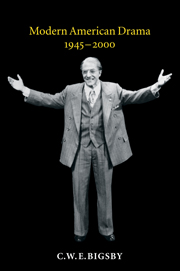Book contents
- Frontmatter
- Contents
- Preface to First Edition
- Preface to Second Edition
- 1 The absent voice: American drama and the critic
- 2 Eugene O'Neill's Endgame
- 3 Tennessee Williams: the theatricalising self
- 4 Arthur Miller: the moral imperative
- 5 Edward Albee: journey to apocalypse
- 6 A Broadway interlude
- 7 Sam Shepard: imagining America
- 8 David Mamet: all true stories
- 9 The performing self
- 10 Redefining the centre: politics, race, gender
- 11 Beyond Broadway
- Notes
- Index
1 - The absent voice: American drama and the critic
Published online by Cambridge University Press: 10 December 2009
- Frontmatter
- Contents
- Preface to First Edition
- Preface to Second Edition
- 1 The absent voice: American drama and the critic
- 2 Eugene O'Neill's Endgame
- 3 Tennessee Williams: the theatricalising self
- 4 Arthur Miller: the moral imperative
- 5 Edward Albee: journey to apocalypse
- 6 A Broadway interlude
- 7 Sam Shepard: imagining America
- 8 David Mamet: all true stories
- 9 The performing self
- 10 Redefining the centre: politics, race, gender
- 11 Beyond Broadway
- Notes
- Index
Summary
In recent years attempts have been made to fill some of the more obvious absences in the literary canon. The battle for the future, as ever, begins with the past. First blacks and then women chose to define present reality in terms of a redefined tradition. The project was an implicit critique of a critical practice that had filtered out experiences not felt to be normative, that had denied a voice to those marginalised by the social or economic system – hence the significance of the title of Tillie Olsen's book Silences and the potency of Richard Wright's image of laboratory dogs, their vocal chords cut, silently baying to the moon, in American Hunger. Language is power, the shaping of language into art is power and the codification of that literature in the form of literary history is also a source of power.
It is, however, not merely the literary expression of the experiences of particular sections of American society that have fallen below the threshold of critical attention. There is also another surprising absence, another silence, another example of critical reticence. Whatever happened to American drama? Why is it that literary critics, cultural historians, literary theorists, those interested in the evolution of genre, in discourse and ideology, find so little to say about the theatre in general and the American theatre in particular? Can it really be that an entire genre has evaded the critic who was once drawn to the poem and then the novel and who, more recently, has chosen to concentrate on literary theory? There are, of course, honourable exceptions, but on the whole the silence has been remarkable.
- Type
- Chapter
- Information
- Modern American Drama, 1945–2000 , pp. 1 - 13Publisher: Cambridge University PressPrint publication year: 2000



